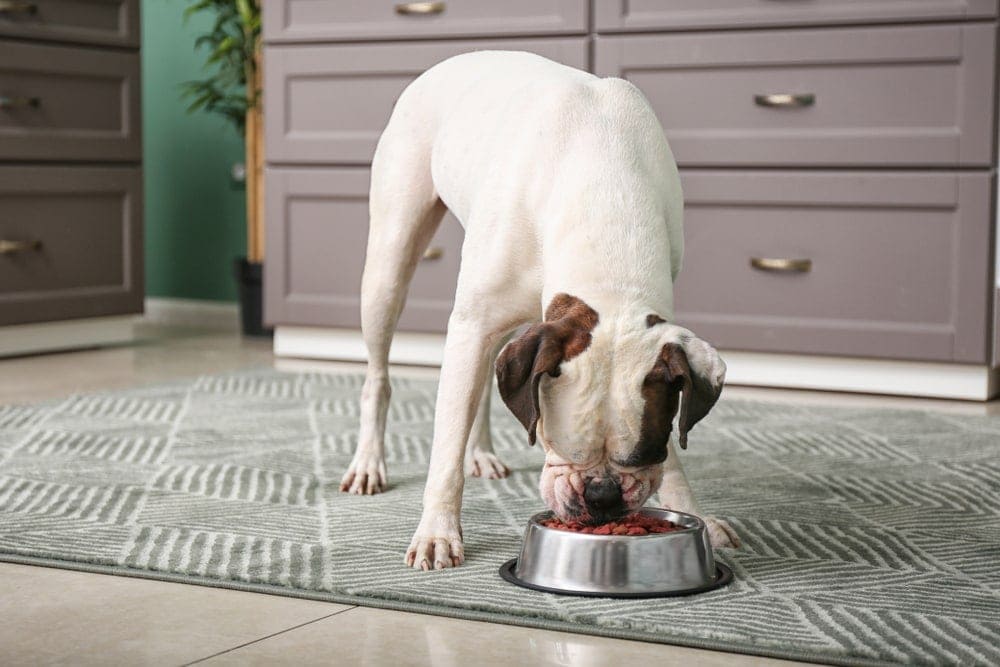Why Does My Dog Throw Up at Night? 6 Vet-Reviewed Reasons

Updated on

It’s 3 AM when you’re heading to the bathroom, and suddenly, you step into a pool of vomit. And that’s not the first time—your dog has thrown up in the middle of the night a few times now. Should you be concerned?
Dogs can vomit at any time, but vomiting in the middle of the night is actually quite common. Most of the time, it’s a sign of a relatively mild problem, but not always. Here are six reasons why your dog might be vomiting in the middle of the night.
The 6 Reasons Your Dog May Throw Up at Night
1. Acid Reflux

Just like humans, dogs can get acid reflux. It often strikes at the same time every day because it happens at the same point in your dog’s digestive cycle. Acid reflux might cause your dog to vomit up yellow bile. It’s best to see a vet to confirm, but this is usually cleared up by including antacid medicine in your dog’s meals or changing up your dog’s food for something milder.
2. Going Too Long Without Meals
Even if your dog doesn’t suffer from acid reflux, going too long without eating can cause vomiting. If you feed your dog their dinner earlier in the day or only feed your dog in the morning, this may lead to vomiting. Going too long without eating can lead to an acid buildup that results in foamy white vomit. Try feeding your dog a snack right before bed or splitting food into more meals throughout the day.
3. Eating Too Much or Too Quickly

On the other end of the spectrum, wolfing down too much food is another common cause of vomiting. If your dog overeats or eats too quickly, you’ll usually see vomiting shortly after eating. But sometimes, it can take a little while for it to all come back up. You might see partially digested food or mostly intact kibble. Feeding your dog several smaller meals will help with this too.
4. Food Allergies
Another possibility is food allergies and intolerances. Some of the most common intolerances are to certain protein sources, like chicken or red meat. You might also see an intolerance to specific grains or vegetables. Switching to a different brand of food might resolve the issue. Look for a different type of protein source, such as fish if your dog usually eats beef, for example. Some grains, like rice, are generally easier to digest than others.
5. Eating Something Inedible

Dogs don’t always know what’s best for them. Some dogs like to get into non-food “treats” that make them throw up. This might include grass, soil, paper, or human foods that aren’t dog-safe. There’s some evidence that suggests dogs will eat grass and vegetation when their stomach is already upset, though. That means that even if you see strange matter in your dog’s stomach, that might not be the cause of the vomiting.
6. Undiagnosed Illness
Most of the options on this list are fairly easy fixes and not causes for serious concern, but there’s also the possibility that your dog is suffering from an undiagnosed illness. Some illnesses that can cause vomiting include pancreatitis, cancer, foreign body obstruction, gastrointestinal ulcers, kidney disease, and liver disease, to name a few. Always contact your vet if your dog has other signs present with vomiting, such as lethargy or appetite loss, if vomiting doesn’t resolve with diet changes, or if there is blood or a “coffee ground” look in the vomit.
Last Thoughts
Vomiting can be both annoying and scary, especially when the cause isn’t clear. In many cases, vomiting isn’t a sign of a major problem, and a minor change in food or feeding schedule may fix it. However, given the possibility of more serious diseases, it is always best to take your dog’s vomiting seriously, as it may be a sign of a larger problem.
Related Read:
- Why Does My Dog Throw Up Yellow Bile?
- What to Do if Your Dog Is Throwing Up After Eating But Acting Normal: Vet-Approved Advice
Featured Image Credit: Daniel Besic, Shutterstock












